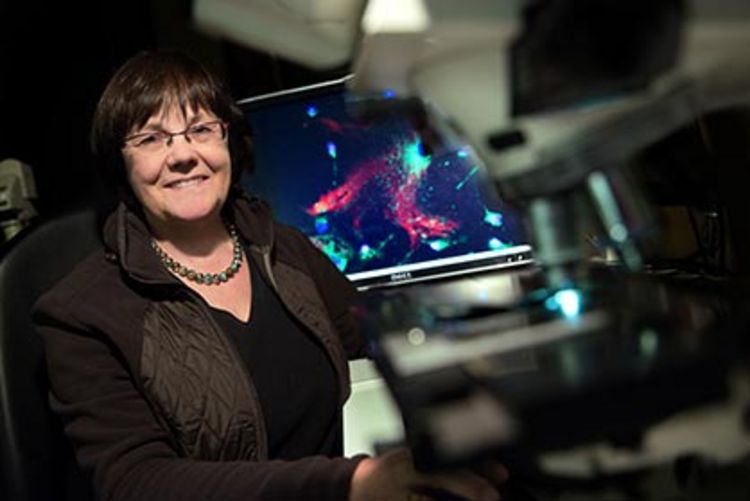Why do neurodegenerative diseases develop and what role does "autophagy", a cellular self-cleaning process, play in the brain? An interview with molecular biologist Christiane Richter-Landsberg.
"The Brain in Health and Disease" is the title of this year's "Oldenburger Schlossgespräche" panel discussion. Is well-being just as much a natural state of the brain as its decay?
RICHTER-LANDSBERG: The brain is our life. This is where our thinking, memory and feeling take place. We owe our capability of speech and intelligence to the brain. Hundred billions of nerve cells send signals and receive them, with the aid of billions of other cells, the so-called glial cells. Our brain is extremely sensitive to disturbances, and this manifests itself in massive functional failures, for example memory loss or motor disturbances. The well-being of our brain is essential for our ability to survive and for the quality of life. Our goal should be to avoid and combat "ailments" caused by an unhealthy lifestyle, but also by the natural aging process and by neurodegenerative diseases like Alzheimer and Parkinson.
And what is the focus of your research?
RICHTER-LANDSBERG: Our brain cells have an extremely complex design. They have an intricate structure, a highly developed system to support the cellular morphology and are in close contact with each other. My research in cellular and molecular biology focuses on the factors that make this complex cell morphology possible under "healthy conditions" – and how the cells communicate with each other. Another focus of my work is analysing the molecular causes of pathological changes, specifically those in glial cells, which occur in degenerative processes of the nervous system and during aging.
And what are the key factors in such degenerative diseases?
RICHTER-LANDSBERG: In the brains of patients with Alzheimer or Parkinson disease and other diseases which involve memory loss or motor disturbances one can observe pathological protein aggregates, typical clumps of proteins. The questions I am trying to find answers to are: How do these clumps develop? How do they damage cells? And how can those cells perhaps be saved?
Your research also focuses on autophagy, a self-cleaning process of the cells. What exactly does this entail?
RICHTER-LANDSBERG: In the course of evolution cells have developed a strategy for breaking down cellular proteins or even entire organelles - for instance mitochondria, the power plants of our cells - that are no longer needed and to reuse the breakdown products of that process in the cell metabolism. This can be described as a kind of recycling process, an efficient form of waste disposal. With the help of this process, known as autophagy, even large clumps of protein and cellular waste produced in the course of a disease can be disposed of.
If such a waste disposal system exists, why do the pathological protein deposits develop in the first place?
RICHTER-LANDSBERG: This is one of the key questions that scientists in this field are trying to answer. Cellular stress situations play an important role here, for example inflammatory processes or aging processes. During such stress situations proteins may be produced or modified and increasingly develop into insoluble forms. Also, in a number of diseases, genetic defects result in defective proteins or in the increased production of proteins which then may form aggregates. The consequence is that the breakdown systems may be overloaded and impaired and no longer have sufficient capacity to deal with the waste. But it may also be that the autophagic process itself is either weakened or defective.
That means that a malfunction in this process can lead to disease?
RICHTER-LANDSBERG: Yes, there are now many indications that this is the case. A malfunction or weakening of the autophagic mechanism can have fatal consequences and result in diseases like cancer, Alzheimer or Parkinson. In my research group we have been able to demonstrate that defective quality control in brain cells and disruptions in the systems for breaking down proteins contribute to the pathological processes. We have published our latest results in international science journals like the Journal of Neurochemistry, PlosOne, and Glia.
So is it possible to alter or influence the cellular self-cleaning process called autophagy in order to prevent the onset of neurodegenerative diseases?
RICHTER-LANDSBERG: Here, too, we have positive results. So far these investigations have only been performed on cell culture model systems and so-called transgenic mice into which foreign genetic material has been introduced or autophagy-relevant genes have been knocked out. In these animals increased formation of the typical protein clumps could be observed, which could then be removed by using certain substances to activate the autophagic mechanism. At the same time these animals exhibited improved learning and memory performance.
So is there a chance that at some point in the future neurodegenerative diseases will be curable?
RICHTER-LANDSBERG: Unfortunately up to now there are only therapeutic means that can delay the progression of the disease, but not cure them. However fabulous advances have been made in recent decades, and our immensely widened knowledge has improved our understanding of the fundamental molecular- and cellular-biological processes in these diseases. There has also been an enormous improvement in the diagnostic possibilities. Moreover the research activities in the area of neurodegenerative diseases are receiving increasing support in Germany, too. People have realised that in our aging population the number of patients will continue to rise, and that this represents a serious social problem. I am therefore very confident that in the next ten years we will find new therapeutic strategies that at least delay the onset of the diseases.
Prof. Dr. Christiane Richter-Landsberg has lectured in "molecular neurobiology" at Oldenburg since 1993. She studied pharmaceutics in Marburg and obtained her doctoral degree in biology in Göttingen. After spending time studying in Israel and the US she acquired her habilitation in Bremen in 1988. Her research focuses on nerve cells and glia, stress responses and the impact of stress proteins on brain cells.

